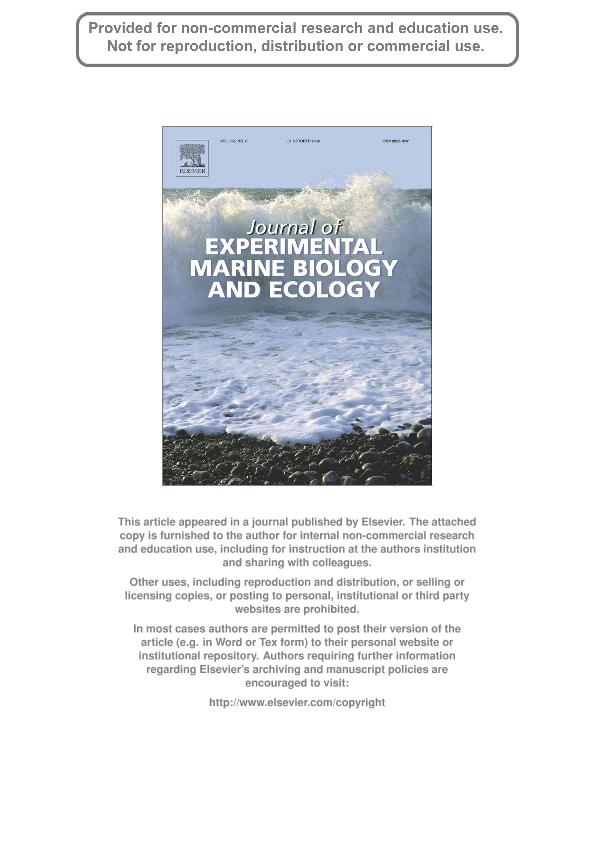Artículo
UVR-induced photosynthetic inhibition dominates over DNA damage in marine dinoflagellates exposed to fluctuating solar radiation regimes
Helbling, Eduardo Walter ; Buma, Anita G. J.; van de Poll, Willem; Fernandez Zenoff, Maria Veronica
; Buma, Anita G. J.; van de Poll, Willem; Fernandez Zenoff, Maria Veronica ; Villafañe, Virginia Estela
; Villafañe, Virginia Estela
 ; Buma, Anita G. J.; van de Poll, Willem; Fernandez Zenoff, Maria Veronica
; Buma, Anita G. J.; van de Poll, Willem; Fernandez Zenoff, Maria Veronica ; Villafañe, Virginia Estela
; Villafañe, Virginia Estela
Fecha de publicación:
10/2008
Editorial:
Elsevier Science
Revista:
Journal of Experimental Marine Biology and Ecology
ISSN:
0022-0981
Idioma:
Inglés
Tipo de recurso:
Artículo publicado
Clasificación temática:
Resumen
The combined effect of solar radiation (UV-B (280-315 nm), UV-A (315-400 nm) and PAR (400-700 nm)) and vertical mixing (i.e., fluctuating radiation regimes) on the marine dinoflagellates Gymnodinium chlorophorum, Heterocapsa triquetra and Prorocentrum micans was investigated during the austral spring in Patagonia, Argentina. Photosynthesis, measured as radiocarbon incorporation, and accumulation of DNA damage, as cyclobutane pyrimidine dimers (CPDs), were investigated under simulated mixed and non-mixed water column conditions using 3 h incubations centered at local noon. Static samples had significant UVR-induced photoinhibition that was higher in H. triquetra as compared to the other two species. Increasing mixing speed significantly increased UVR-induced inhibition of carbon fixation in G. chlorophorum and H. triquetra. No significant UVR effect was observed in P. micans under any of the mixing regimes. Most of the loss in carbon fixation in G. chlorophorum was due to UV-B while in H. triquetra it was due to UV-A. Part of these responses may be associated to the presence of UV-absorbing compounds which were abundant in P. micans, and low in H. triquetra and in G. chlorophorum. However, other variables such as cell size and active repair might have also influenced our results. We did not detect CPD accumulation in any of the species, probably because of the low solar angle that resulted in very low levels of DNA effective UV-B dose. Our results indicate that exposure to solar UVR in the Patagonia area during spring time (even during ozone depletion events) has a clear impact on photosynthesis and much less or negligible on DNA in the three studied species. © 2008 Elsevier B.V. All rights reserved.
Palabras clave:
Dinoflagellates
,
DNA
,
Mixing
,
Patagonia
Archivos asociados
Licencia
Identificadores
Colecciones
Articulos(SEDE CENTRAL)
Articulos de SEDE CENTRAL
Articulos de SEDE CENTRAL
Citación
Helbling, Eduardo Walter; Buma, Anita G. J.; van de Poll, Willem; Fernandez Zenoff, Maria Veronica; Villafañe, Virginia Estela; UVR-induced photosynthetic inhibition dominates over DNA damage in marine dinoflagellates exposed to fluctuating solar radiation regimes; Elsevier Science; Journal of Experimental Marine Biology and Ecology; 365; 2; 10-2008; 96-102
Compartir
Altmétricas



